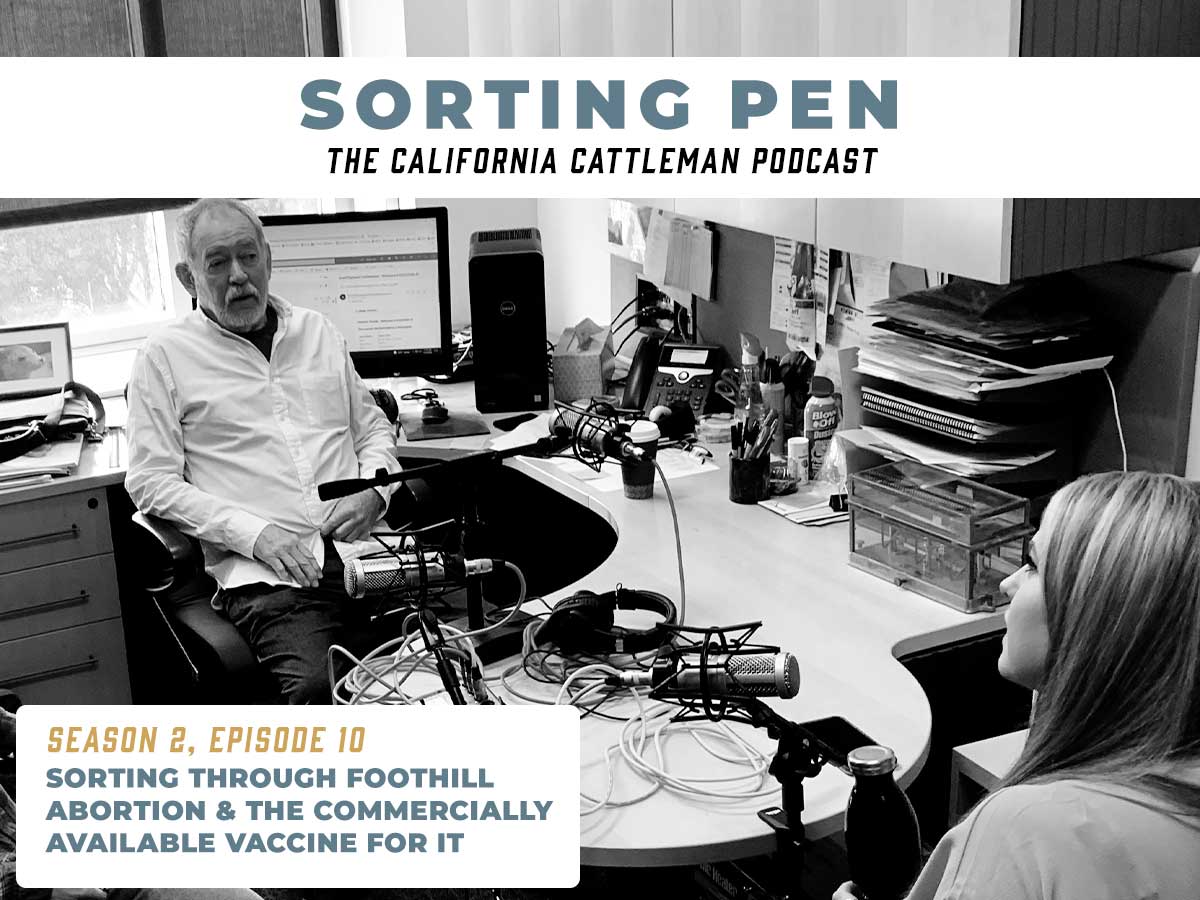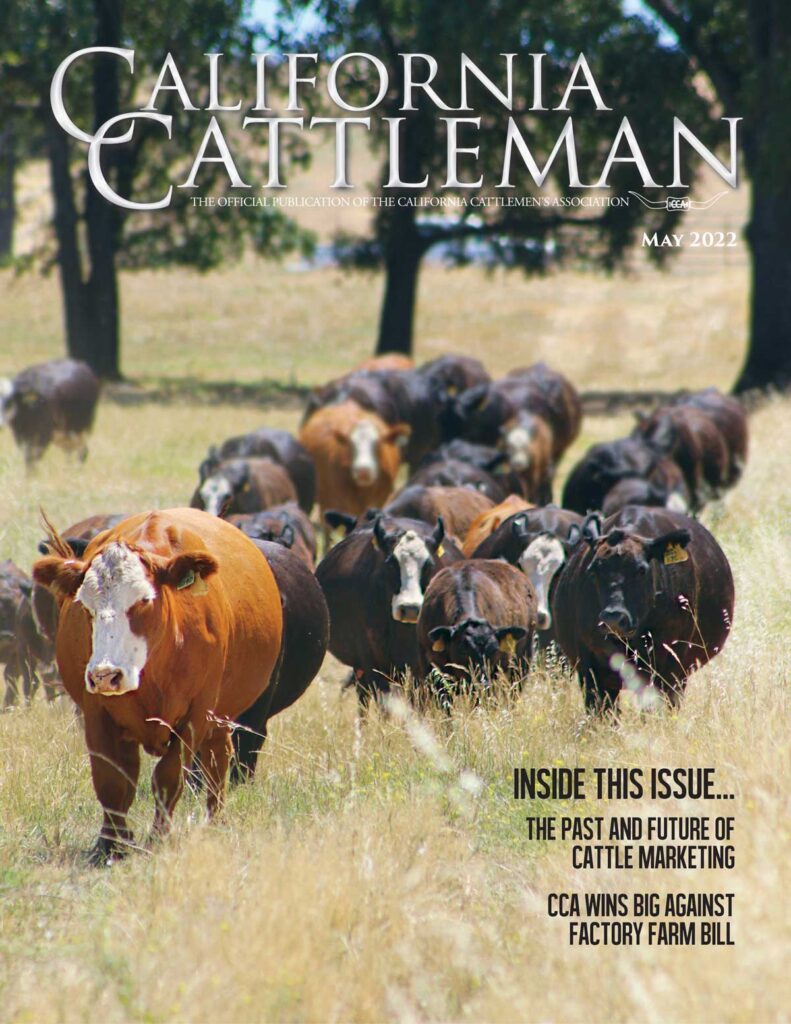
LEGISLATIVE BULLETIN
May 17, 2022
To read the full version each week, please subscribe below.
Governor Newsom Releases May Revise of 2022-23 State Budget
On Friday, Governor Gavin Newsom unveiled the “May Revise” of the Administration’s proposed 2022-23 State Budget. CCA staff is currently reviewing the May Revise, and will provide relevant highlights of the budget proposal – as well as context regarding CCA’s budget advocacy – in next week’s edition of Legislative Bulletin. To view the May Revise, click here.
California Cattle Council Seeking Requests for Proposals
The California Cattle Council is launching an effort to allocate funds to local agricultural associations, producers, researchers or other interested individuals to conduct work that fulfills the priorities of cattle producers at a local or county level. The Council is using this opportunity to offer partnerships to fund local initiatives and priorities as a trial with the hope to build this program out further in the future.
For this year, grants will be limited to $10,000 per project. Please click here to visit the Council’s website for a copy of the Request for Proposal (RFP) that includes all the information a person will need to apply for funding. Proposals are due on June 17, 2022. Please share the RFP with any organizations, qualified individuals, or researchers that could utilize these funds to advance a local project or address a challenge. When reviewing projects for funding, the Council will pay close attention to ensure the proposals meet the requirements outlined in the RFP and are not duplicative of existing projects or initiatives.
To learn more about the grants and the Council’s commitment to maximizing Council dollars through funding projects with partnerships click here to read an update from Justin Oldfield, the Council’s executive director. Click here to subscribe to monthly updates from the Council.
SWRCB Issues Weekly Curtailment Updates
Last week, the State Water Resources Control Board (SWRCB) updated the status of water rights curtailments in the Sacramento-San Joaquin Delta watershed, announcing that as of last Wednesday, May 11, all “Post-1914 appropriative water rights in the San Joaquin River watershed outside of the Legal Delta with a priority date of 1957 or later” are curtailed.
For more information and to check the status of your water right, visit the Delta Drought Webpage. Questions can also be addressed to the SWRCB via email to Bay-Delta@waterboards.ca.gov.
For any questions about curtailment notices or how to comply, ranchers may also contact the Ranchers Technical Assistance Program at (916) 409-6902 or rtap@wrstrat.com.
USDA Designates All California Counties Primary Natural Disaster Areas Due to Drought
Late last month, U.S. Secretary of Agriculture Tom Vilsack designated all 58 counties within the state as primary natural disaster areas due to drought. The designation allows USDA’s Farm Service Agency “to extend much-needed emergency credit to producers recovering from natural disasters through emergency loans.” Ranchers must apply for such emergency loans by the application deadline of December 8. For more information, see last week’s edition of Legislative Bulletin.
CNRA Releases Final Pathways to 30×30 Report
The California Natural Resources Agency (CNRA) has released its Final Pathways to 30×30 Report. California’s “30×30 initiative” aims to conserve 30% of the state’s lands and coastal waters by 2030. According to the report, CNRA currently deems approximately 24% of the state as “conserved,” with the state aiming to “durably protect” an additional 6% of state lands over the next eight years. For more information on 30×30 and CCA’s work on the issue, see the May 2 edition of Legislative Bulletin and keep an eye out for the May edition of CCA’s Hot Irons newsletter.
Upcoming CCA Events
CCA Feeder Meeting
May 25-27, San Diego
Click here to get all the details on this year’s event including featured speakers.
CCA Midyear Meeting
June 22-23, Rancho Murieta
Being held just outside of Sacramento this year, we encourage you to maximize your membership by attending and being an active part of the CCA policy making process. Come hear updates from researchers, industry leaders and experts, agencies and affiliate organizations. Your voice helps develop policy that provides direction for CCA and will influence the future of ranching. Click here for details on registering and reserving your room at the Murieta Inn.
Upcoming Industry Events
AB 589 Water Measurement and Reporting Courses Scheduled for May 26 in Redding and Woodland
May 26, Redding & Woodland
The University of California Cooperative Extension (UCCE) has announced that it will offer two water measurement and reporting courses, as authorized by CCA-sponsored Assembly Bill 589 (2017), on Thursday, May 26 in Redding and Woodland. There will be a limited number of trainings offered in 2022, so early registration is encouraged. For details on the Redding training click here. The Woodland training details are available here.
USDA NRCS Services & Funding Programs Information Session
May 26, Virtual
The Fresno State Office of Community & Economic Development (OCED), USDA Natural Resources Conservation Service (NRCS), and USDA Office of Partnerships & Public Engagement (OPPE) are hosting an information session for stakeholders at 10 a.m. on Thursday, May 26. Conservation Technical Assistance and funding programs including the Environmental Quality Incentives Program (EQIP) and the Conservation Stewardship Program (CSP) will be explained. To RSVP click here.
CCA in the News
CA releases final 30×30 report Western Livestock Journal “The California Cattlemen’s Association (CCA) in its May 2 Legislative Bulletin said while the report stresses conservation easements, it does appear to class them as ‘conserved.’ CCA states more than 2 million acres are under conservation easements, but CNRA’s mapping tool for visualizing 30×30 only shows a little more than 768,000 acres of land.” To continue reading, click here.
Farmers’ truck exemption may be extended under bill Ag Alert “Farm Bureau is one of several agricultural organizations backing the bill, sponsored by the California Cattlemen’s Association. The bill’s author is Assemblyman Tom Lackey, R-Palmdale. It cleared the Assembly Transportation Committee unanimously April 26 and is now before the Appropriations Committee.” To continue reading, click here.
Industry News
Natural and Working Lands and farmers and ranchers highlighted in draft updated AB32 Scoping Plan for greenhouse gas reductions CDFA Planting Seeds Blog “Stemple Creek Ranch owners Loren and Lisa Poncia have utilized multiple state funding programs, including CDFA’s Healthy Soils Program and the Department of Conservation’s Working Lands and Riparian Corridors Program and California Farmland Conservancy Program. This funding is helping to protect the ranch from future development through a conservation easement, is helping to improve the quality of the soil as well as livestock forage, and is helping to restore a stream. All of these actions reduce or avoid greenhouse gas emissions and improve the environment.” To continue reading, click here.
2 Largest reservoirs in California at critically low levels even before summer Environ “Two of the largest reservoirs in California have critically low water levels as the ongoing drought is expected to make the upcoming summer an even dryer one for the state.” To continue reading, click here.
California to open first new state park in 13 years The Mercury News “On Friday, as part of his revised May budget, Gov. Gavin Newsom is scheduled to announce that the state is acquiring 2,100 acres near the confluence of the San Joaquin and Tuolumne rivers to become a new state park — an area rich with wildlife and brimming with possibilities to reduce flood risk and restore some of California’s lost natural heritage.” To continue reading, click here.
Americans Don’t Trust One of the Best Methods to Control Wildfires Time “Prescribed fires are ignited intentionally to cull forest growth that could act as dangerous fuel for unplanned wildfires. When they go as planned—as the vast majority do—they don’t make news. But when they get out of control, they make headlines, which can erode public trust in the practice, even as wildfires have become increasingly destructive due to global climate change.” To continue reading, click here.
This update is a little longer than most Sorting Pen episodes, but it is worth the listen as UC Davis professor and researcher Dr. Jeffrey Stott and EBA Product Manager at Hygieia Biological Labs Jenna Chandler discuss Foothill Abortion. Hear about the research behind the vaccine, accessibility to it and ongoing research. Click here to listen.



